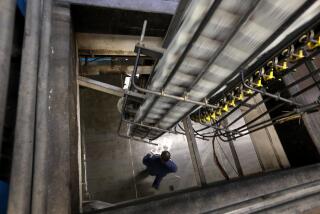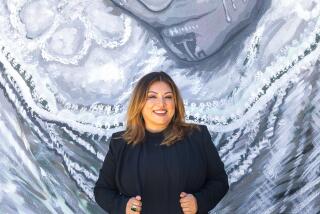Terrible Fall Lands Printer in a New Field of Exploration
- Share via
Tony Salas took a terrible fall in the print shop where he worked 10 years ago, a mishap that crushed his spine and crippled the career that had fascinated him since childhood. The day after the injury, pain rushed through his body like bolts of electricity, forcing him again to the floor on all fours. At that moment, and for several agonizing months, Salas worried he would never stand again.
Single and childless at the time, Salas faced the prospect of losing his livelihood--and his passion. This was high-class, glamorous printing he was doing, producing big national ads and making movie posters for major studios. The low-key, unflappable printer even spent the occasional late-night shift working with the likes of Warren Beatty, a demanding perfectionist who personally inspected the bright colors on ads for the film “Dick Tracy.”
The thrill of that work would soon be gone forever. Salas underwent an operation for his spinal injury, fought his way back on his feet and retrained for a new career. Six years ago, he emerged as developer of Internet courses and multimedia instruction for the Coast Community College District.
That may seem like a long way from media glitz. But for Salas, the new job was just a roundabout route back to a little taste of glory.
Today, it’s Tony Salas, Emmy winner.
Salas, 47, was awarded the television statuette in June for his graphics design and animation on an instructional video, “Dollars and Sense: Personal Finance for the 21st Century.” Emmys also went to other members of the team that produced the 26-part telecourse. Salas’ contribution helped jazz up what could have been a dry topic.
Meanwhile, his personal life became a lot livelier, too. He was married in 1992 to Kyung Kim, his fiancee at the time of his accident. Kyung helped him recover and soon the couple became the instant parents of two boys, then 8 and 2, Kyung’s nephews who arrived for a weekend and never left.
“It’s hard for me to accept defeat,” Salas told me this week at his DesignWorks studio on the campus of Orange Coast College in Costa Mesa. “I don’t like hard-luck stories.”
Salas and his co-winners received their honors at the 51st annual Los Angeles Area Emmy Awards, held this summer at the Pasadena Civic Auditorium. The local honors, granted by the Academy of Television Arts and Sciences, precede the Primetime Emmys, which are announced with a lot more fanfare.
This year, minorities demonstrated at the televised Emmy show to protest the absence of minority characters in the lineup of new network shows. But Salas says diversity was much in evidence at the local ceremony, where minorities were well-represented as winners in news, sports, technical crafts and instructional programming.
Salas said he was used to being the only Latino at professional gatherings and on technology committees within his college system. So he did a double-take when he walked into the auditorium to find so many other Latinos waiting to pick up Emmys.
“Gee, things are changing,” he thought. “There’s a silent professional majority out there who happen to be Hispanic.”
Salas has never been the type to beat his chest about his ethnicity. His father was born in Los Angeles, descendant of the hardy Tarahumara Indians of Mexico, known for their stamina as runners. His mother, who died eight years ago, came from a line of Basque sheepherders who settled outside Albuquerque.
Salas prefers to call himself Hispanic, in deference to his mixed roots. By whatever name, he felt the tug of a cultural bond at that awards ceremony.
“I don’t know how to describe this, but there was a kind of personal pride there, I guess, because I had never felt that personal camaraderie of my group,” said Salas, whose speech is deliberate and systematic. “But when I looked around at that event and noticed just how many people were there from the same culture as I am, it made me smile.”
Salas was born in Gardena in 1951 and moved to Westminster two years later. His father, Leland Joseph Salas, 79, worked for the Ford Motor Co. for 30 years. As a boy, Salas remembers taking rides in new cars just off the assembly line.
But it was an uncle’s job in the pressroom of a small Gardena newspaper that provided his career inspiration. As a boy, he was in awe of the roar of the big presses, the huge rolls of newsprint and the wizardry that produced a neat bundled newspaper at the end of the line.
That’s one of the coolest jobs you could have, he thought. He’d eventually spend 20 years in printing and advertising design.
Much of it was careful, detail work--tailored to his character. He’d spend five hours to perfect the image of a shadow under the tire of a Toyota in a print ad. Then, he’d relish the quiet satisfaction of knowing that his work was being seen by Americans everywhere, in magazines, posters and billboards.
But it was also a job that required him to be on his feet all the time. When his accident pulled the ground out from under him, his wife helped him get up again.
“She has stuck by my side this whole time and really endured a lot,” says Salas, who calls her yobo, Korean for sweetheart.
Six years ago, the couple offered to take Kyung’s nephews for a weekend. It was a favor to her brother and sister-in-law so they could get away to resolve some marital problems, Salas recalls.
The plan didn’t work. The marriage broke up and the boys simply stayed in the stable household with their gomo, the Korean name for aunt. The boys call Tony ajushi, the word for uncle, which is also a term of respect for elders.
Salas and his wife, a painter trained in Seoul, are legal guardians for Shawn and Robin, now 14 and 8. Though Salas can no longer play tennis and go deep-sea fishing as he did before his injury, he volunteers to shoot video for football games at Ocean View High School, where Shawn is on the freshman team.
In his new college job, Salas also found ways of putting old talents to new use. His eye for clean graphics helps him create attractive Web pages for teachers who are putting their courses on the Internet. And he still feels the printer’s thrill of seeing a product through from concept to completion.
“I get paid to test, try, explore and create,” Salas says. “It’s a wonderful playground of technology to exercise my creativity.”
Today, he’s in a field that changes almost daily. And Salas says he thrives on keeping up, discovering, exploring.
And evolving.
When he fell that day at work a decade ago, Salas slipped into an uncertain and unfamiliar future. For him, that worked out just fine.
“Most people like to be in the known, where things are stable and fixed,” he says. “I prefer to be in the unknown, because that’s where I learn.”
Agustin Gurza’s column appears Tuesday and Saturday. Readers can reach Gurza at (714) 966-7712 or agustin.gurza@latimes.com.
More to Read
The biggest entertainment stories
Get our big stories about Hollywood, film, television, music, arts, culture and more right in your inbox as soon as they publish.
You may occasionally receive promotional content from the Los Angeles Times.










